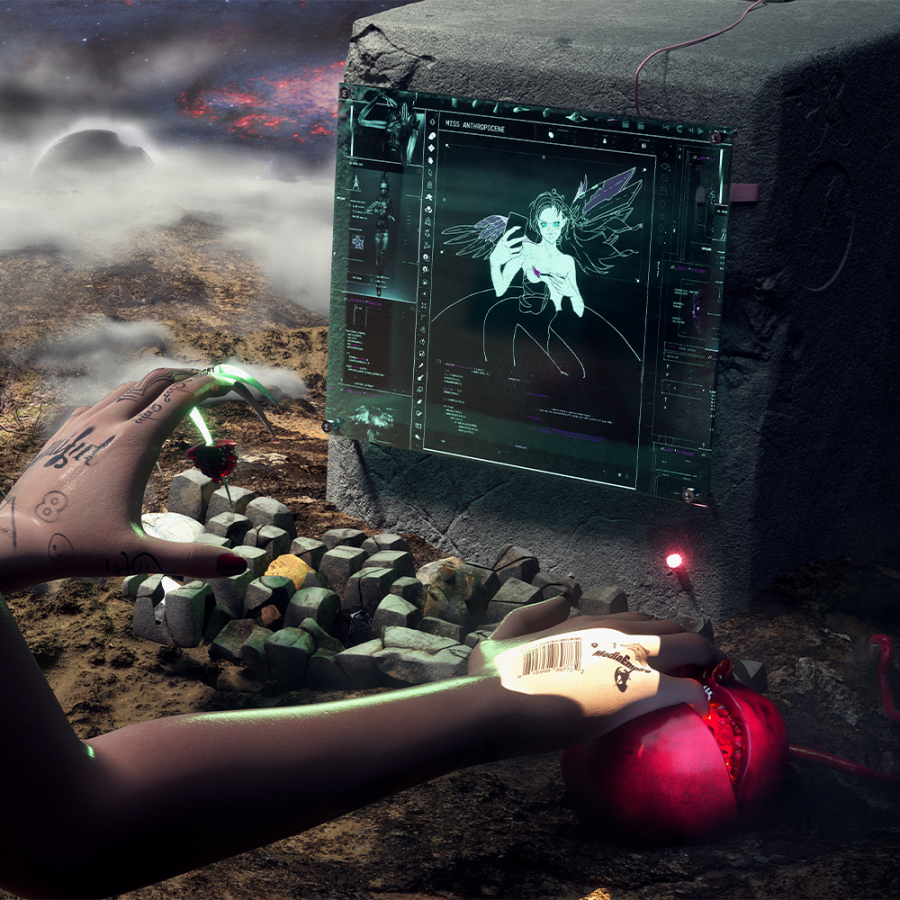Miss Anthropocene by Grimes – Review
The album art to Grimes’ first studio since 2015 album, Miss Anthropocene
In February of this year, Canadian artist Grimes released her fifth studio album, Miss Anthropocene, her first release since her 2015 album Art Angels. Her latest release features heavy, electronic sounds and dark, morbid lyrics and imagery to criticize the way people have abandoned their values in favor of technology.
The album opens with the track “So Heavy I Fell Through the Earth”, immediately hitting the audience with light, breathy vocals, and heavy, electronic production. The lyrics describe the speaker held down by her love for someone, and the slower, heavy beat builds that feeling well in the listener. This song evokes a similar experience to something by Tame Impala, but with more aggressive instrumentation.
The next track “Darkseid” bears much heavier lyrics, as the speaker talks about how the ghost of someone they lost haunts them, even though they have nothing more to offer. The extremely heavy instrumentals add to the feeling of discomfort and fear described in the lyrics, accompanying them well. The song presents a dark look at death as the speaker rejects people’s attempts to comfort them, attempting to create more similarities than differences between the living and the dead.
In a shift from the darkness of the first two songs, the third track, “Delete Forever”, moves to a dreamier sound, with more upbeat music and vocals, even though the lyrics do not shift much upwards. The speaker discusses how they feel lost and empty after trying to recover from losing someone. The references to technology throughout the album begin to take a clearer shape in this song, as the speaker starts to criticize the way society handles death today, an idea they fill out later in the album.
Violence, the fourth track, continues the upbeat tempo, presenting something resembling a dance beat, keeping with the darker lyrics. The song presents an abusive relationship, and while the situation is straightforward, paring it alongside the strong themes about technology allows for many less straightforward interpretations. Many people see this song as a metaphor for the relationship between humans and the Earth, though the song can be related to many people and situations.
The next song, “4ÆM”, blends happier beats with heavier, electronic ones, moving between seamlessly. The lyrics reference falling down, calling back to the first song, and building the idea that when the speaker is vulnerable they are more susceptible to falling into traps of past relationships.
In a thematic shift from the past couple of songs, “New Gods” takes shots at the way people have abandoned traditional values in favor of turning to technology and fame. The speaker seems to directly address God, telling him that they are going to let go of him, as he cannot give them what they want. The airy, soft vocals and productions create a somber, almost ambient sound, making the lyrics more reflective than aggressive like some of the other songs.
“My Name is Dark” quickly shifts back to the earlier sound with hard production and some of the harshest lyrics on the album. The song basically embodies chaos, as the speaker threatens to turn to drugs and violence as a response to their anger. The song possesses a clearer call to action, more obviously pointing out the failure of society to properly help people in need, allowing them to turn to less productive, more dangerous ways of coping with problems.
Continuing the themes from “My Name is Dark”, “You’ll miss me when I’m not around” presents easily the darkest lyrics on the album, presenting a clearly suicidal speaker, criticizing the way society fails to care for people before they die, only becoming aware of any problems after a person is already gone. This song was likely inspired by the recent string of celebrity deaths, particularly in the music industry, caused by drugs, suicide, and other problems. The song has more standard vocals and production, again calling more attention to the lyrics. The song carries the powerful message that we need to care for people before the problems become too strong, not wait until after and reminisce on how we could have done better. This song is easily the most poignant, heavy song on the album, carrying an incredible amount of emotional weight on it.
Keeping with the heavier reflection on death, “Before the fever” focuses on the experience of someone as they die. The song begins with a somber, reluctant tone, slowly moving onto acceptance. The song has compressed vocals, but deeper, not high pitched like most of the rest of the album, and features heavy drums and baselines, aiding the depressing, slow tone the song takes.
The penultimate song on the album, “IDORU”, takes a more upbeat tone, presenting an almost classic love song. The song’s lyrics and production are quite straightforward, without any complex or abstruse imagery, which builds a certain charm into the song. Coming from the darkness of the past few tracks, this song creates a nice change of pace before the finale, and the simplicity makes it easy to understand and get behind.
“We Appreciate Power” finishes the track going back to the heavy sound of the start of the album one last time, concluding album and presenting its ultimate idea. The speaker abandons God, ultimately abandoning past values, in favor of technology, makeup, AI, and modern technology. The song criticizes the way that people treat social media and project their life onto the internet as dangerous and not truly living. Super aggressive, metallic and electronic sounds color the song, conveying the speaker’s transition from traditional human values to worshipping technology.
Miss Anthropocene combines unique and well-crafted sounds with brilliant lyrics that shift between deep symbolism and metaphors to more straightforward lines to convey an experience that criticize problems in modern culture and how we deal with them. Grimes’ new album is easily one of the best of the year so far and every track on it is intentional, well-made, and interesting to think about.

James Martini’s interest in writing began as early as the second grade, and he has written ever since. As a senior, he began his career at the Jesuit Chronicle, writing about the numerous activities, events, and issues facing the Jesuit student body and community today. His primary interests center around art, skateboarding, and pop culture. Outside of writing, James produces music and develops video games both as himself and as part of Jesuit’s Game Design Club. He also plays a pivotal role in the Robotics team, working as its captain in the 2018-2019 school year. He worked with Jesuit’s Zero Robotics club in 2018 and 2019, successfully advancing to the international finals at MIT in Boston, working alongside teams from San Francisco and Italy. When not working on school or other projects, James passes time skateboarding, a passion he first took up when he was six, and rekindled in 2019 after a nearly five year break from the activity.




